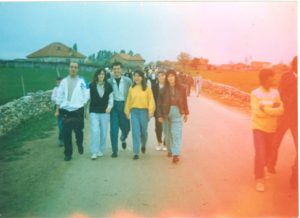This is the third story in a series of ten stories about the 1990 Reconciliation of Blood Feuds Movement. The tellers are Raif Musa and Valdete Bajrami Musa, husband and wife, information technology professionals from Ferizaj, who were activists of the Movement.

In the photograph: From the right, Minire Ademi, Valdete Bajrami, Raif Musa, Syzana Jupa. The Reconciliation of Blood Feuds gathering in Bubavec, April 26, 1990.
There were difficult cases, as well as interesting cases, one case in Podujeva, for example, in which the murderer was from Ferizaj, while the victim was from Podujeva. And we went to Pristina, where we picked up professor Liman Rashiti and together with him we left for Podujeva. We also picked up an old man from Podujeva who had reconciled bloods before, his last name was Obranqa, Selim or…I forgot his name, and we left for the house of those who had to forgive the blood. On the way we met a brother of the victim, we met him by accident, but it was good that we met him.
And he said, “This is he,” and we stopped, we said, “We are from the Reconciliation Councils of Pristina and Ferizaj.” He said, “You should not go to our house!” “Why?” He said, “Because our mother doesn’t know that our brother was murdered,” he said, “Our mother only knows that our brother was killed, I mean, he died in a car accident, a German ran over him, a car, and she never knew that someone murdered him, and you should not open new wounds.” But he said, “Count this thing as done.” “We didn’t want it to be like that, but we wanted to gather all the brothers in order to [decide]…you know,” otherwise, if it is only forgiven by one…we always wanted to be sure, we didn’t include their mother because she was already too old to be able to take revenge. I mean, it was a very touching case, and they forgave the blood without telling their mother, while she thought that her son was crushed by a car in an accident.
Eh, I didn’t publish that case, because I published a book in 2010, but I didn’t publish most of the cases because of the agreements we had with the families who forgave [the blood]. They said, “I forgive it, but I don’t want to show it in public, I don’t want it to be published either,” you know, they didn’t want their name to be shown. “I am forgiving it for the sake of the blood of the youth,” but that’s where it ended. Someone stronger showed it directly in the gatherings, where they hugged and forgave the blood. But there were many of those who forgave the blood to us, and we went and communicated it to the other family. Even though there are also many unreconciled cases, they are not so many in our municipality. There were cases where they didn’t reconcile, there were cases where the ones who had to forgive the blood did so, but the one who was supposed to accept it didn’t accept forgiveness at all, there were such crazy cases as well.